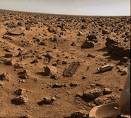
Sometimes there’s nothing like a good long trip to make you realize that there is no place like home. Take Mars for instance. Having traveled over 450 million kilometers, the two rovers that NASA has sent there have sent back photos that seem in comparison the anything on earth, well… boring.
Not surprisingly, NASA seems more enthusiastic about these rather dreary vistas, using words like: “Amazing!” “Mind-blowing!” “Eye-popping!”
Eye-popping?? That’s a little much. The Martian rovers are working well and finding many interesting things but perhaps the biggest discovery they’ve made is how incredibly beautiful our own planet is in comparison to the lifeless monotony of Mars.
Let’s turn the situation around. Suppose some hypothetical Martians sent a lander to Earth. Assuming it didn’t get immediately trampled by a passing animal or human, virtually every single place it might alight it would find bristling with tenacious life– every drop in the ocean, every thimbleful of soil, every puff of air.

Life defines Earth and in many important ways, our planet seems to behave like a single organism. The regulation of atmospheric gases, global temperatures and ocean chemistry are all mediated in part by life, in impossibly complex ways that we are only beginning to understand. With climate change breathing down our necks, figuring out how this planet works is not merely an academic exercise.
So why all the fuss to go to Mars and look and look for life there, when we haven’t come close to cataloguing all the life on our own beautiful planet? It is currently estimated that we have identified as little as 1.5% of all the species on Earth. At the current pokey rate, we might finish documenting all the life here in about 500 years.
The problem is that species are vanishing on Earth at a disconcerting rate – and almost all before we even have a chance to identify them. The current rate of extinction due to human factors is about 1000 times above what is considered “normal” in the geologic record. Scientists now fear that this shocking loss of species may increase by another factor of ten as climate change kicks in, resulting in the loss of one quarter of all land plants and animals by 2050.
The irony is that we currently spending far more money exploring for life on other planets that we do on our own. The annual budget of NASA is over $15 billion – many times more than what we are spending looking for life in our own backyard.
Now word comes from President Bush that the US government is committing a further $12 billion towards eventually putting a man on Mars. Apart from the fact that this budget reallocation will result in the much loved Hubble Space Telescope falling from the sky, how much would that money accomplish here on Earth?
The All Species Foundation estimates that we could document all the life on the planet in as little as 25 years. Cost estimates for this mammoth task range up to a mere $2 billion per year – only slightly more than 10% of NASA’s annual budget.
We literally have no idea what we could find in the astounding profusion of life on Earth. Unknown insects, plants, fish, birds, mammals, literally hundreds of millions of them are waiting to be discovered. Apart from better knowing and loving our beautiful home, there are also very pragmatic reasons for wanting to have a better look around.
Fully one quarter of our prescription drugs are derived from just forty plants. Less than 1% of all flowering plants have been tested for pharmaceutical properties. Life being resourceful as it is, many bacteria have evolved resistance to our most popular antibiotics and there is an increasing need to find replacements. The best place by far to look for interesting and useful new compounds is the laboratory of life.
There is also a moral imperative. We are now living in the midst of the biggest global extinction since the end of the dinosaurs, and the reason quite frankly is us. For better or worse, we are in charge around here and the least we can do is itemize what is being lost before it is gone forever. Our children deserve at least that much.
We all love the excitement of exploring the unknown. If we want to take on a truly heroic task, let’s fully explore the marvel of life here on Earth. Completing the noble feat would a far greater accomplishment than putting a boot print on Mars. We don’t need to cast a covetous gaze at other planets – we may well be living on the most remarkable piece of real estate in the universe. Let’s have a look around.
Mitchell Anderson is freelance writer living in Vancouver. Published in the Globe and Mail, April, 2004.
No comments:
Post a Comment